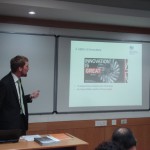7th September 2012 Bangalore, India
Catapulting innovation
Ever since I worked in Knowledge Management for Mahindra Satyam I have been fascinated by how research ideas become products on the shelf. Looking at examples of university spinouts or SMEs one realises that most success in the product space is due to hard work, access to the right ecosystems, funding, and technology networks to build upon. Very few ideas get to become products due to sheer luck.
Quite often this commercialisation process is a long drawn-out affair and associated with risks of failures. One of the reasons is that researchers and business innovators find it difficult to access an expertise pool or centres of excellence in a particular area.
Supporting this process is an area of growing importance to the Science & Innovation team in India. The Science & Innovation Council in April this year highlighted a number of actions the UK and India would explore to deepen innovation collaboration. We recently published a report mapping innovation in India. And last night my colleague, Tom Wells, was speaking at the TiE Bangalore’s Clean Tech Special Interest Group about the UK’s innovation system and clean technology.
Finally, a large part of my job over the last 12 months has been helping to link Bangalore and Cambridge together as two world leading research and innovation clusters. That has led to next week’s event at the Indian Institute for Science on Science, Innovation and Entrepreneurship which will be graced by the Vice Chancellor of the University of Cambridge. We’ll let you know how the event goes but if you want to register, please email in.
In the mean time, those with an interest in innovation may like to know about the UK government programme establishing a series of technology and innovation centres called Catapult Centres. These centres are overseen by the Technology Strategy Board (TSB), which is the UK’s lead innovation agency, and will see an investment of £200 million from the government over four years.
The Centres will allow businesses to access equipment and expertise that would otherwise be out of reach, as well as conduct their own in-house R&D. They will also help businesses access new funding streams and direct them towards promising technologies. In a nut shell scientists, engineers and business innovators will be able to pool expertise, intelligence and experience across the UK to accelerate innovations.
Seven Catapults are being set up across the country on a range of exciting and relevant themes:
• high value manufacturing
• cell therapy
• offshore renewable energy
• satellite applications
• connected digital economy
• future cities, and
• transport systems
The high value manufacturing catapult centre is already open for business and will be joined very soon by cell therapy, located at the Guy’s Hospital in London. The UK has world-class expertise in life-sciences and the Catapult Centre will enhance advances in regenerative medicine. Once all the centres are up and running, it is hoped that they will be sustained through a mixture of funding from business R&D contracts, collaboratively applied R&D projects, and core public funding.
I’m closely following their development, and spotting the opportunities to link them with innovators in India.
1 comment on “Catapulting innovation”
Comments are closed.